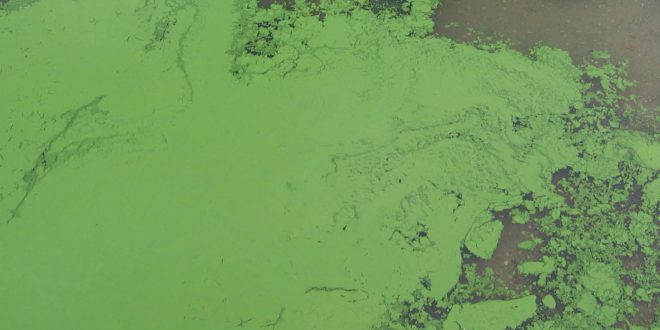Blue-green algal bloom confirmed on Bass Lake, Manitoulin Island.
The Ministry of the Environment and Climate Change has advised the Sudbury & District Health Unit that results from samples taken September 26, 2016, from Bass Lake are positive for blue-green algae (cyanobacteria). The samples contained a species of cyanobacteria that can produce toxins.
What are blue-green algae?
Blue-green algae are primitive microscopic organisms that live in freshwater lakes around the world. Normally, blue-green algae are barely visible but, given certain conditions, populations can rapidly multiply to form a large mass called a “bloom”. Most blooms contain plant species that are harmless to human health; however, the presence of even one toxic species can pose a risk. Only laboratory analysis can determine whether or not a bloom is toxic.
What causes blue-green algae?
Blue-green algae are primitive microscopic plants that live in freshwater lakes around the world. Blue-green algae blooms are well suited to lakes with high phosphorus and nitrogen levels. Hot temperatures can cause the algae to bloom, just like the flowers in your garden. Road salt and silt due to construction do not cause blue-green algae.
Is my drinking water safe?
Municipal drinking water remains safe due to the extensive purification system before it reaches your tap. Well water is also safe to consume. Drinking water directly from an affected lake may be unsafe.
There is no effective home treatment to remove blue-green toxins from the water – this includes boiling, treating water with chlorine, and jug filtration systems. The only safe alternative is to use bottled water or water obtained from a municipal drinking water system.
The Sudbury & District Health Unit advises people who are on their own private water systems that there are a number of precautions they should take to protect their health if blue-green algae blooms are visible:
- Avoid using the lake water for drinking, bathing or showering, and do not allow children, pets or livestock to drink or swim in the lake water.
- Residents should not boil the water because boiling the water may release more toxins into the water.
- Residents should avoid cooking with the water because food may absorb toxins from the water during cooking.
- Residents should not eat the liver, kidneys or other organs of fish caught in the water.
Agencies/Canadajournal
 Canada Journal – News of the World Articles and videos to bring you the biggest Canadian news stories from across the country every day
Canada Journal – News of the World Articles and videos to bring you the biggest Canadian news stories from across the country every day



